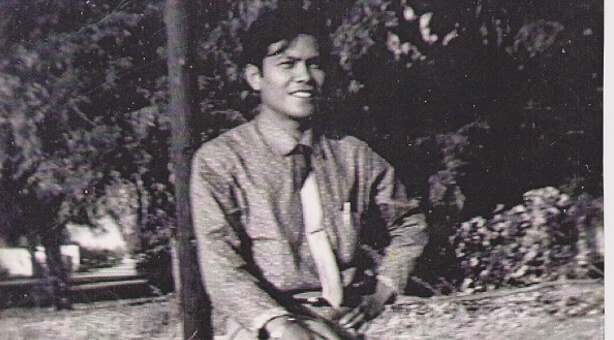My father, Leonardo Aquino Corpus Sr., once wielded a bolo knife—a Filipino style machete used by farmers and warriors in the Philippines. He waved his bolo knife in the dark wee hours of the morning looking for my ghostly tormentor. I was a toddler who tried to climb into bed between him and mom. He leapt out of bed in his underwear when I told him I was scared of the boogie-man.
“Where’s the boogie-man?” He whispered while waving the giant knife. “Come out boogie-man! I’m going to get you!” He shouted into the dark while wildly waving the bolo sword and standing in a fighting stance. The comic scene made me feel safe, protected and secure. I wish that bolo knife was enough to keep away the demons that haunted us in years to come.
While he searched for the boogie-man, I crawled into bed next to mom. He realized that the scared little girl wasn’t following him and he put the bolo knife underneath the bed and laid down next to me. That was one of the happiest nights that I remember with my dad.
My dad was complicated, passionate and ruthlessly intelligent. He had a degree in accounting but couldn’t find a job in central California. There was a lot of prejudice against Filipinos at that time. Prejudice might have shut that door or his bluntness.
He was handsome in a Bruno Mars way with a petite build. He had the wide smile, curly hair that women liked and a sense of humor. Yet underneath the charm was a temper that was legendary.
This temper ran in the family. You didn’t mess with my dad and I was afraid of him. He never hit me, but I remember the screaming matches between him and mom. And the visit at my Aunt Juanita’s house where I was stretched between mom and dad.
Dad wanted me to stay with my aunt and mom wanted to take me. I felt like I was going to bust in half as they both pulled my arms from opposite directions. I think he let mom win because she scooped me up in her arms and fled the house with my brother in another arm.
He was in and out of my life because he didn’t pay child support. Mom started living with my stepfather, Celes, when I was 8 years old. Celes was another Filipino man with long black hair and a blue Mustang. He raised me but my dad made the greatest impact on my life. My brother, Leo, and I spent summers at his house in south Stockton.
I learned to type on his typewriter when I was 10 years old. Leo had married Connie and settled into a life of gardening. I think this was the happiest I had ever seen him. He loved to plant and pick vegetables and fruit.
At night, I turned on the radio and listened to big band music and wrote stories on the typewriter. My brother read his comic books while dad watched boxing on the little black and white TV in the living room. During the day we worked in the garden and at night I read or wrote stories.
Leo faded from my life at 12 and I hated him. I don’t know why but I didn’t want anything to do with him. He never hurt me, yet this hatred toward him consumed me.
My stepfather, Celes, also tried to reach out to me. I resisted his attempts at being a father and ignored him. Later I called Leo to apologize for pushing him out of my life when I was in college. And I sent a card to Celes asking for his forgiveness for the years I had shut him out.
I wish I could turn the clock back and say what I wanted to say to my dad. Instead, the last conversation with my dad was a fight. He insisted that I needed to send my kids to private school. I was already sending them to a private school and vehemently told him.
When I got off the phone, my husband shook his head. “Honey, let the man win,” he said. “He’s old. Let him win.”
If Dad was alive, I would let him win the argument. Mom told me that I was just like him … smart and blunt. Then she would follow that with how much of a rat he was for not paying child support.
But for all of the children whose parents are deceased, here’s what I would say to my dad if he was alive.
I love you.
I never said these three words.
I miss you.
Some other words I never said to him when he was live.
I’m sorry. I’m sorry I was wrong about you. I’m sorry that I shut you out. I’m sorry that I belittled you. I’m sorry that I was condescending. I’m sorry that I made no effort to spend time with you and you died in a small apartment alone. You were dead for a week before anyone discovered you.
I’m sorry that I call myself a follower of Christ but you never saw it. I’m sorry.
Leilani Haywood is an award-winning writer and editor of Spirit Led Woman. Follow her on Twitter @leilanihaywood.














































